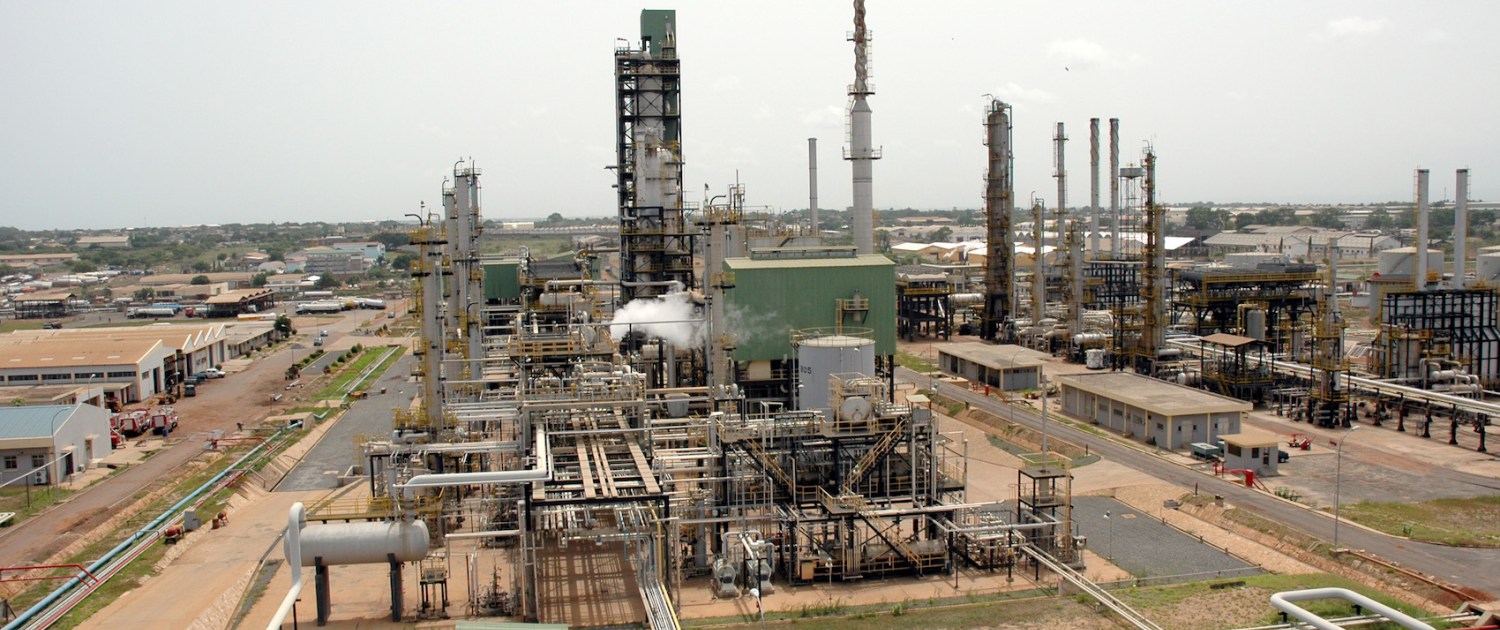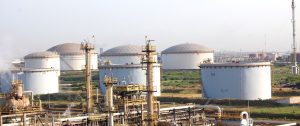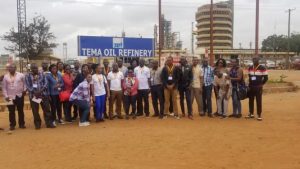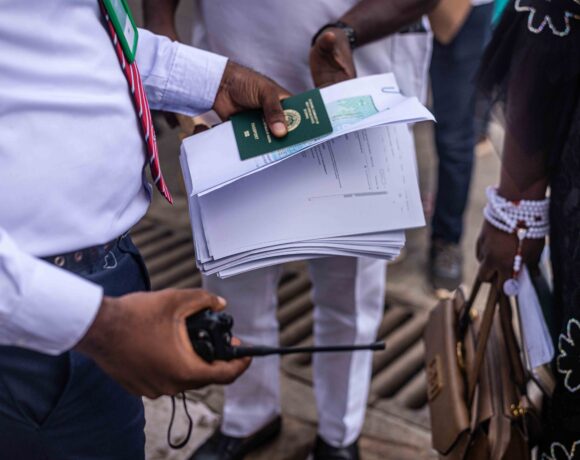Tema Refinery: City of Pipes, Tanks and Towers

With youthful anxiety for the Friday excursion to Accra’s Tema Oil Refinery, I struggled out of sleep at a very odd hour. I woke up at the dark and unholy hour of 2.00am when human beings were at rest but the spirit world active with unrest. Strangely, I felt struck with an inexplicable nausea and motion sickness which caused the room to swirl around me or made my senses to swirl around the room in a state of confusion.
A clog in my wheel?
‘This is a symptom of malaria,’ my mind told me, digging into the archive of my memory with common illnesses. To worsen my predicament, my head ached as if the absolute silence of the night had turned into a loud drumbeat in my ears. With hatred I felt like throwing up.
‘Oh!’ I lamented. Under malaria attack, I would not make the trip to TOR, a full day field trip which was a practical aspect of the two-week training on oil and gas at the Summer School in Accra, sponsored by the Natural Resources Governance Institute. ‘I can’t afford to miss this once-in-a-life-time trip,’ was my instinct. If I did, I would miss the once-in-a-life-time opportunity which should translate my acquired knowledge of the theory of the midstream sector of oil and gas to reality.
To push back the illness, I switched off all the electrical bulbs, throwing the room into thick darkness; closed my eyes; threw myself into the bed, and struggled into the white bed sheet. I prayed without ceasing so that this cup of illness would pass over me on Friday, August 31, 2018. I rolled on the bed, grabbed the pillows as if to block the dizziness from wheeling me to the floor. Shortly after, I slumbered and slept off till the mild atmosphere tweaked my body and woke me up.
The time was 6:48am – only 12 minutes was left for me to beat the 7.00am take-off time from the hotel. Having put my jeans and thick top on the chair the previous night, I sped through the shower, struggled into my dress in the haste of a schoolboy whom the hand of the clock had left behind as the school bell tore into the morning sun. In spite of my haste, I couldn’t beat the 7.00am meeting time. The luxury bus had roared and rolled away from the hotel premises until the programme officer Angela noticed my loud absence and halted the journey to pick me up.
Fresh air in Accra
I felt at peace with myself that I made it to the bus. The morning sun was late to rise, so the morning air cumbered the space, smelling fresh wand friendly hile oozing some kindness into the nostril. As we hit the expressway, I noticed that the streets of Accra had woken up and actively busy. Middle-aged, almost tired buses and taxis of a couple of colours but tainted with yellow, occupied the roads. Hawkers snaked in between the vehicles with their wares on their heads and their anxious hope for patronage shooting out of their eyes.
It was my most relaxed view of Accra. The typical Ghanaian contentment manifested in the humble two and three-storey buildings that left the wide sky very clear and beautiful. It was unlike New York or London where ubiquitous and high-rise structures obstruct the natural beauty of the space above the head. I fed my eyes with the pleasure of the simplicity of this city as we drove from the alleys to the expressway that led us to Tema.
Tema: City of pipes, tanks and towers
We made the 24 kilometres journey from Accra to Tema in a good mood. As we alighted from the bus, the tanks, pipes and towers of Tema Oil Refinery shoot out widely to announce itself as the glory of this Ghanaian industrial area. For the first time in my life I stood in front of a refinery. Nigeria has four refineries – two in Port Harcourt, one in Warri and another in Kaduna. But the story and history of their rise and fall drained my desire to visit any of them. In spite of the billions of Naira channelled through the pipelines to inject life into the refineries, they have never really woken up from their slumber. Even when they did, they never stood on their feet, not to talk of walking with gait. A functional refinery, therefore, seemed magical, especially to Nigerians who wake and sleep with the impression that their refineries would never work.

Sitting on a landmass that is the size of about 10 football fields, TOR, as it is called, was a spectacle to some of us in the team whose only experience of a refinery were in photographs or on television. They threw my mind back to the initial session in the Summer School in which facilitators emphasized the huge, unattainable capital investment needed to become a player in the oil and gas sector. Standing in the refinery, I felt very little as I compared my salary as a journalist with the gigantic amount it would take to set up such a refinery.
“How can one make sense of the diverse shapes of pipes that criss-crossed from one plant, tank and tube to another,” I asked myself. They looked like crossword puzzles, difficult to decipher except with a guide.
‘Tema can refine any crude oil’
Engineer Raphael Kwaku came to our rescue. Charismatic and enthusiastic, he led us from one tank and pipe to another. “We refine any kind of crude oil here,” he began with pride and confidence. “The crude is pumped from the tank farm with gravity through tunnels from one point to another at a boiling temperature of about 120 degrees. The turbine pumps push the crude oil, transport it from one pipe to another at a very high temperature and heat exchanges that peak at 350 degrees…”
The engineer initiated us into the world of petroleum engineering as he pointed to one pipe, pump and tank after another, explaining their relative roles, the degree of precision that must be exerted to avoid any devastating error. He explained the distilling process, starting with the cracking of heavy crude oil into lighter ones that could be used in vehicles, machines and at home on a daily basis.
Pointing at a huge tube, Engineer Kwaku said, “At the bottom is what we call the residue, which when further refined produces bitumen for road construction, chemicals for fertilizer and sulphur. The next level is where we have diesel for heavy vehicles. The next layers as we move up are where we have kerosene, gasoline, naptha and finally gas, which is more of vapour.” From his explanation, the that aphorism that crude oil is ‘black gold’ crystalized in my mind – no by-product of crude oil is a waste. Indeed, crude oil is wealth.
‘The machines are okay, but…’
We drove through the large expanse of TOR to discover what was stored in more than 60 gigantic tanks spotted all over the large field. There were tanks for crude oil, diesel, gasoline, kerosene, and all the products of the refinery. Quite a huge investment. Established in 1963 as the premier refinery in Africa, Tema refinery, at its glorious moment, has the capacity to refine 45,000 barrels of crude oil per day. But it has joined the league of other refineries in Africa that are idle. Tema has not refined crude oil in the last six months.
“The machines are healthy, okay,” Engineer Kwaku told us. “ But we don’t have crude oil at the moment. If we had crude oil right now, we’ll activate our machines and move into action.”
Without functional refineries, Africa has continued to import refined petroleum products. The singular argument has been that it is cheaper to import finished products than to refine in Africa. But the logical question is: why is it cheaper to refine in Europe and elsewhere than it is to refine in Africa? The answer is in modernization. With modern technology the production process is abridged and the cost of production shrinks to the size that makes products affordable. Instead of being stuck to the past, African leaders and engineers should keep pace with changes in industries in order to curtail importation and keep our workers busy.
With the factory’s idleness, the tour of Tema Oil Refinery in Accra began with an excitement but ended in a denouement.

The Insight Report
Nigeria Coverage



